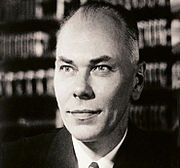Howard H. Aiken
| Howard Hathaway Aiken | |
|---|---|

Howard Aiken
|
|
| Born |
March 8, 1900 Hoboken, New Jersey |
| Died | March 14, 1973 (aged 73) St. Louis, Missouri |
| Nationality | American |
| Fields | Applied mathematics, computer science |
| Institutions | Harvard University |
| Alma mater |
University of Wisconsin-Madison Harvard University (doctorate) |
| Doctoral advisor | Emory Leon Chaffee |
| Doctoral students |
Robert Ashenhurst Gerrit Blaauw Fred Brooks Martin Greenberger Kenneth E. Iverson Leroy Martin Anthony Oettinger Gerard Salton Warren Semon |
| Known for | Automatic Sequence Controlled Calculators Harvard Mark I – IV |
| Notable awards |
Harry H. Goode Memorial Award (1964) Edison Medal (1970) |
| Spouse |
|
Howard Hathaway Aiken (March 8, 1900 – March 14, 1973) was an American physicist and a pioneer in computing, being the original conceptual designer behind IBM's Harvard Mark I computer.
Aiken studied at the University of Wisconsin–Madison and later obtained his PhD in physics at Harvard University in 1939. During this time, he encountered differential equations that he could only solve numerically. He envisioned an electro-mechanical computing device that could do much of the tedious work for him. This computer was originally called the ASCC (Automatic Sequence Controlled Calculator) and later renamed Harvard Mark I. With engineering, construction, and funding from IBM, the machine was completed and installed at Harvard in February, 1944. Richard Milton Bloch, Robert Campbell and Grace Hopper joined the project later as programmers. In 1947, Aiken completed his work on the Harvard Mark II computer. He continued his work on the Mark III and the Harvard Mark IV. The Mark III used some electronic components and the Mark IV was all-electronic. The Mark III and Mark IV used magnetic drum memory and the Mark IV also had magnetic core memory.
Aiken was inspired by Charles Babbage's difference engine.
Aiken accumulated honorary degrees at the University of Wisconsin, Wayne State and Technische Hochschule, Darmstadt. He was elected a Fellow of the American Academy of Arts and Sciences in 1947. He received the University of Wisconsin–Madison College of Engineering Engineers Day Award in 1958, the Harry H. Goode Memorial Award in 1964, the John Price Wetherill Medal in 1964, and the IEEE (Institute of Electrical and Electronics Engineers) Edison Medal in 1970 "For a meritorious career of pioneering contributions to the development and application of large-scale digital computers and important contributions to education in the digital computer field."
...
Wikipedia
